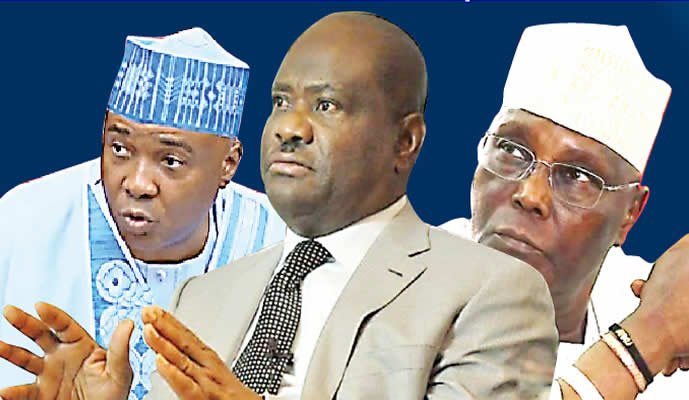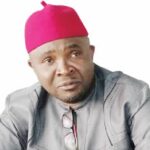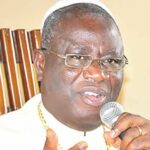
Nigeria’s main opposition party, the Peoples Democratic Party, ended its presidential primary in Abuja on Saturday with aspirants contesting for the party’s presidential ticket. In what appeared to be a keenly contested race between former Vice President Atiku Abubakar and the Governor of Rivers State, Nyesom Wike, the primary obviously threw up winners and losers. Atiku emerged as the biggest winner with the biggest prize and will be facing the candidate of the ruling All Progressives Congress in the 2023 presidential election. SEGUN ADEWOLE presents a catalogue of the winners and the losers of the exercise
The former officer of the Nigeria Customs Service emerged as the presidential standard-bearer of the PDP by scoring 371 votes, while his closest rival, Wike, polled 237 votes. Atiku, who served as vice president in the administration of former President Olusegun Obasanjo from 1999 to 2007, ventured into politics in 1993 when he contested for the presidential ticket of the Social Democratic Party. He, however, stepped down at the party’s Jos Convention for the late MKO Abiola who went on to win the annulled 1993 presidential election. Atiku, whose business interests lie in education, transportation and real estate, has unsuccessfully contested for the Office of President of Nigeria five times (1993, 2007, 2011, 2015 and 2019).
North
Atiku’s emergence as the standard-bearer of the PDP has positioned the North as one of the winners that emerged from the opposition party’s presidential primary. The North currently has one of its own as President of Nigeria, in the person of the President, Major General Muhammadu Buhari (retd.), who will complete eight years in office in 2023. If Atiku goes on to win the 2023 presidential election, it means the North will retain the Presidency for another four years and with the prospect of making it eight years. Atiku’s emergence as PDP’s presidential candidate has also led to speculations that the APC may have to opt for a northerner as its presidential candidate. If such happens, then it will become certain that the North will retain the Presidency, putting to bed the calls for it to return to the South based on the gentleman’s agreement between the South and the North when the PDP was the ruling party.
Aminu Tambuwal
The Governor of Sokoto State and former Speaker of the House of Representatives is regarded as one of the winners that emerged from Saturday’s election despite not taking part in it. Tambuwal had stepped down on the night of the election and directed his supporters to vote for Atiku. This decision is believed to have been the gamechanger that led to Atiku’s victory on the night. The decision, according to speculators in the PDP, was made based on an agreement between Tambuwal and Atiku’s camp shortly before the election. Meanwhile, Tambuwal is believed to have obtained a form to enable him to run for Senate and may require the support of the Atiku’s camp to achieve the mission. Also, if he gets to the Senate and Atiku emerges as President in 2023, the former Speaker is speculated to be banking on Atiku’s camp to become the President of the Senate. Atiku, while reacting to Tambuwal’s support, tweeted: “Thank you, H.E @AWTambuwal, for your spirited campaign. I look forward to working with you as we unite our party and our country.”
Nyesom Wike
The Rivers State governor, who got 237 votes from delegates, lost to Atiku by 134 votes. However, he is considered as one of the winners of Saturday’s primary. The high number of delegates he was able to pull showed his capacity and ability to pull votes. It is believed he is going to be one of the major power brokers if the PDP eventually wins the 2023 presidential poll.
As of the time of filing this report, he had yet to issue any congratulatory message to the winner of the PDP presidential primary despite earlier stating that he would support whoever emerged as the winner. The former Acting Minister of Education had said, “…as a committed party member, I don’t have to leave the party and I will never leave the PDP. Even if I don’t win the primaries, I will support whoever wins.” As earlier stated, Tambuwal’s withdrawal from the contest and his backing of Atiku may have prevented Wike from clinching the party’s ticket. The Sokoto governor’s backing of Atiku happened despite the support he got from Wike during his quest for the PDP presidential ticket in 2019, which Atiku got.
Losers
Bukola Saraki
The immediate past President of the Senate and former governor of Kwara State came third in the primary election. Despite selling himself to delegates as the one with real solutions to combat terrorism, create millions of jobs and keep the cost of living low in the country, Saraki was only able to get 70 votes. He has, however, congratulated Atiku while calling for support for all those who emerged as candidates of the PDP ahead of the 2023 general elections.
Dele Momodu
The Chief Executive Officer of Ovation Magazine scored no vote in the presidential primary. He had been trying to be President of Nigeria since 2011 and had submitted his expression of interest form to contest the 2011 presidential election on the platform of the Labour Party. Momodu later left the party to join the National Conscience Party on which platform he contested and lost the 2011 presidential election.
Anyim Pius Anyim
The former President of the Senate was one of those expected to help the South-East, which had never occupied the Presidency, to do so. He went into the contest with vast experience, having served as Secretary to the Government of the Federation in the ex-President Goodluck Jonathan’s administration. The delegates were, however, not moved as he was only able to secure 14 votes, placing him in the sixth position. In a statement he personally signed, Anyim lamented that votes were cast based on primordial sentiments. He said, “…I am shocked that consideration for voting the PDP presidential candidate was not based on burning national issues and how to resolve them, but still on the old primordial sentiments. It appears doubtful if our search for nationhood is yielding any results.”
Udom Emmanuel
The Akwa Ibom State governor came fourth with 38 votes. He and his counterpart from the South-South, Wike, contested for the PDP presidential ticket when no one expected anyone from their region to be interested in the Presidency. One of their own, Jonathan, had held the position for five years before he was defeated by the incumbent, President Buhari, in 2015. Apparently, the belief in a rotational Presidency between the North and South, with the South expected to get the 2023 Presidency, may have attracted South-South aspirants to try their luck despite the South-East claiming it’s their turn since the region has yet to occupy the position.
South-East
The South-East, being the only region in the South yet to produce a President, had expected to produce President Buhari’s successor in 2023. The region had been asking to get the presidential tickets of the two major political parties. However, Saturday’s PDP presidential primary indicated that the region may not produce Nigeria’s next President in 2023. This is due to speculations that the APC may also field a Northerner in disregard of the likes of the Governor of Ebonyi State, David Umahi; former governor of Imo State, Senator Rochas Okorcha, and others who are members of the party from the South-East gunning for its presidential ticket. Hopes were high for the South-East through a former governor of Anambra State, Peter Obi, who had contested as Atiku’s running mate in 2019. This time round, Obi decided to gun for the PDP ticket alone. He, however, withdrew from the race days before the election and also tendered his resignation from the PDP, leaving the South-East with sixth-placed Anyim as its hope of clinching the PDP ticket.
Bala Mohammed
The Governor of Bauchi State got 20 votes despite assuring delegates that if he was elected as President, he would leverage resources and bring the best people from various sections of the country to provide Nigerians with the desired exemplary leadership.
Ayodele Fayose
Hours before the presidential primary, Fayose, a former governor of Ekiti State, had banked on his record of defeating incumbents. This is despite the fact that no incumbent will be on the ballot in 2023. He said, “A two-time governor of Ekiti with a clean record of only Nigerian to defeat an incumbent twice.” He was, however, unable to secure the vote of the 16 delegates from his state during the election as he scored no vote.
All rights reserved. This material, and other digital content on this website, may not be reproduced, published, broadcast, rewritten or redistributed in whole or in part without prior express written permission from PUNCH.
Contact: [email protected]
Copyright PUNCH.
All rights reserved. This material, and other digital content on this website, may not be reproduced, published, broadcast, rewritten or redistributed in whole or in part without prior express written permission from PUNCH.
Contact: [email protected]




